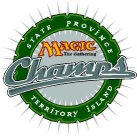Study and Grow Strong – Tournament Reports
I will read most articles about Magic on the internet. From strategy for formats which I shall never play to theory I don’t understand, I find them all fascinating. But my favorite kind of article, by far, is the tournament report. I understand from my editor that tournament reports aren’t the most popular kind of article, but whether you are a Pro Tour wannabe or a casual player interested in good stories about the game we all enjoy, a well-written report has got to be at least as much worth a read as yet another of those boring strategy articles about Red Deck Wins or a discussion about Magic ethics.


 Dan is back to deliver you not just one, but two different decks, just in time for States. He starts off by channeling Jamie Wakefield to deliver you the best Green deck he could come up with for current Standard, and then tells you what deck he will be playing on Saturday. This article is an absolute must read, because even if you already know what you are playing this weekend, your opponents might not, and Dan’s decks have a habit of changing the metagame.
Dan is back to deliver you not just one, but two different decks, just in time for States. He starts off by channeling Jamie Wakefield to deliver you the best Green deck he could come up with for current Standard, and then tells you what deck he will be playing on Saturday. This article is an absolute must read, because even if you already know what you are playing this weekend, your opponents might not, and Dan’s decks have a habit of changing the metagame.